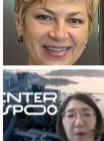The IURC Japan Kick-off took place in a hybrid format on 2 October 2025 as part of the Kyoto Smart City Expo 2025, co-hosted by Kyoto Prefecture. The session marked the formal launch of the International Urban and Regional Cooperation Programme (IURC) Phase II in Japan, bringing together European and Japanese representatives to deepen city and regional collaboration across thematic clusters such as urban innovation, industrial modernisation, clean energy, circular economy, and climate adaptation.
Opening Session: Reinforcing EU–Japan Urban Ties
The meeting opened with welcoming remarks from Mr. Andreas Röttger, Head of Regional Team – Asia/Pacific at the European Union’s Service for Foreign Policy Instruments (FPI). He underlined the EU’s long-term engagement with Japan in supporting livable urban innovation and knowledge exchange through the quadruple helix approach—linking government, academia, business, and civil society.
Mr. Röttger emphasised that IURC Phase II continues to build on a decade of successful decentralised cooperation, now strengthened by structured thematic clusters. He invited cities and regions to participate in upcoming IURC global thematic webinars covering six clusters—mobility and transportation, urban innovation, circular economy, climate adaptation, urban regeneration, and social integration, and the IURC Global Thematic Network event in Barcelona (4–6 November 2025).
Following him, Mr. Cesar Moreno, FPI Representative for Japan, reflected on 13 years of EU–Japan cooperation, recalling milestones achieved through previous initiatives under the EU’s external action framework. He commended the Japanese partners for their openness to co-developing solutions on shared challenges—ranging from energy transition to demographic change—and reiterated the EU’s commitment to supporting peer-to-peer learning and concrete pilot implementation.
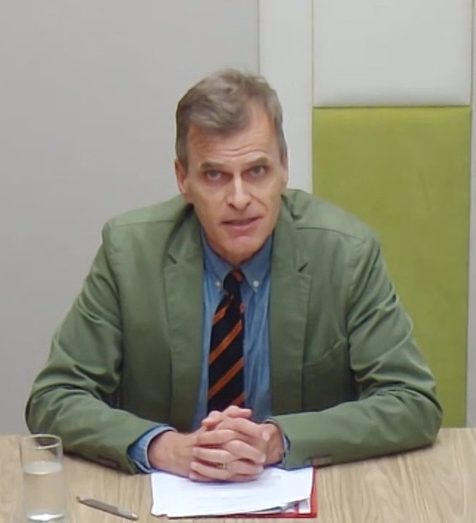
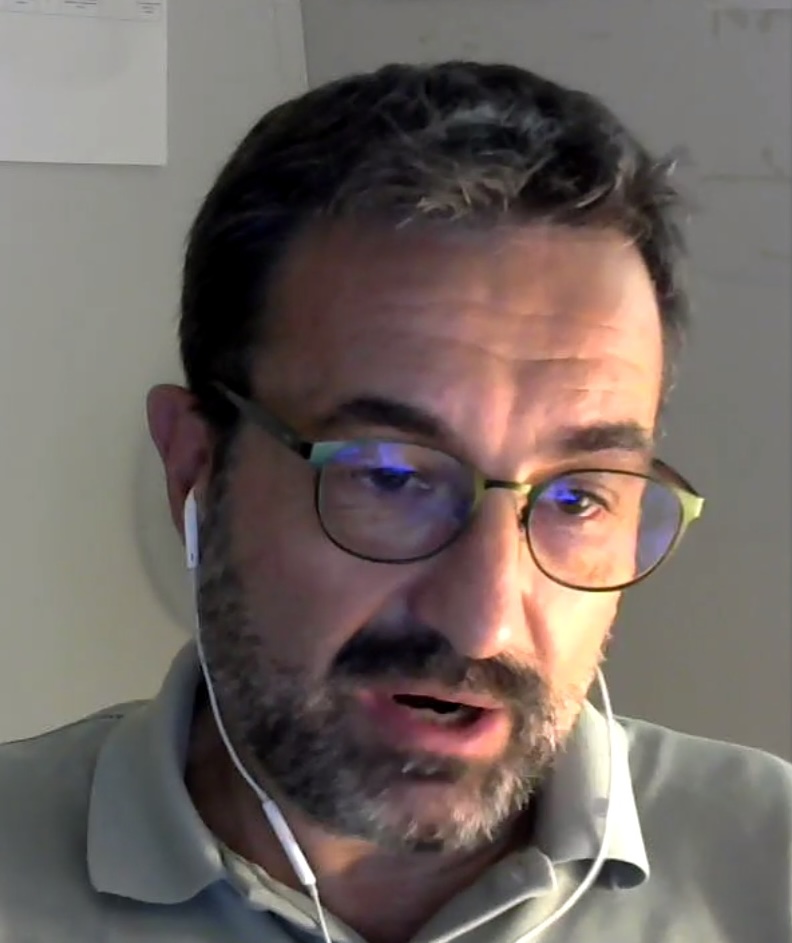
Review of Progress and IURC2 Priorities
Professor Hidefumi Imura, IURC Country Coordinator for Japan, provided a comprehensive overview of cooperation achieved since the programme’s early stages. He noted that earlier exchanges focused primarily on industrial modernisation and smart city technologies, which have now expanded to include urban innovation, food systems, clean energy, circular economy, and climate adaptation.
He introduced the new IURC2 structure in Japan, which revolves around two key components:
- Community of Practice – an open platform uniting EU and Japanese cities and regions to share methodologies, case studies, and challenges through continuous interaction and capacity building.
- Thematic Cluster Activities – structured collaborations organised around key themes such as industrial modernisation, urban innovation, and circular economy, implemented through webinars, bilateral exchanges, and pilot actions.
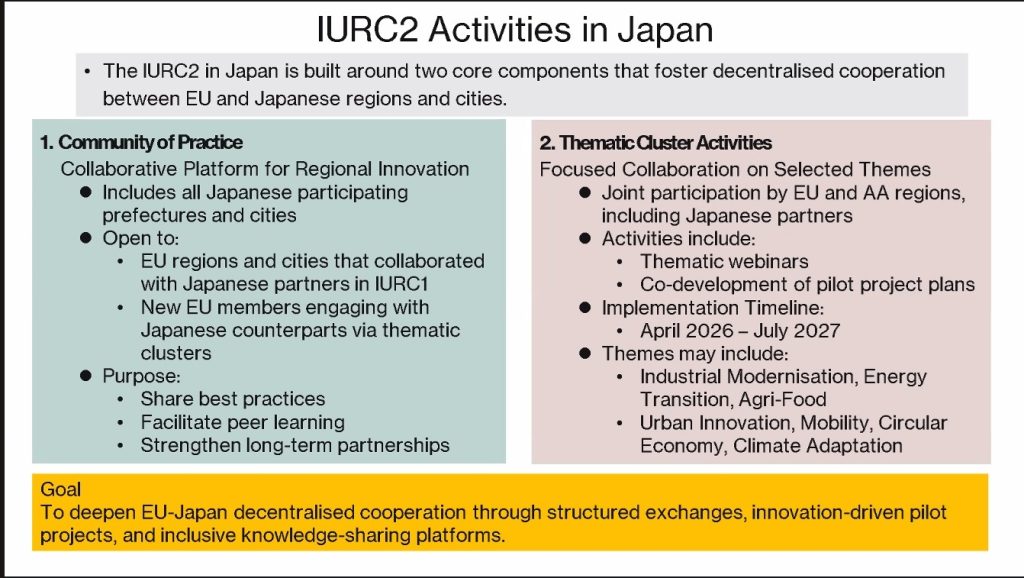
Professor Imura also presented a “Mind Map” of Japanese interests, showing how local governments are aligning their regional strategies with global sustainability objectives. He emphasised that the cross-cutting nature of themesallows for linkages between industrial, environmental, and social goals, making Japan a critical partner in the Asia–Australasia component of IURC2.
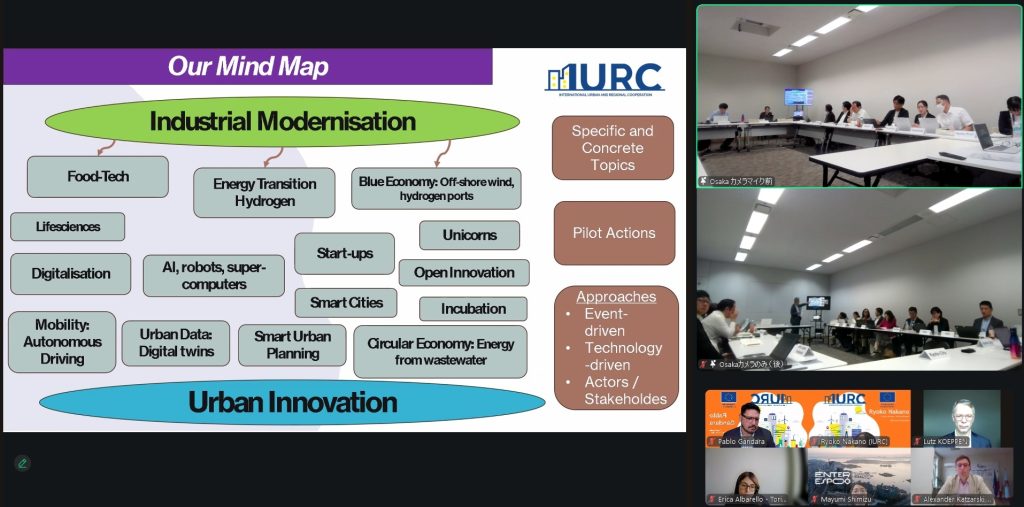
European Regions and Cities: Renewed Engagement and Emerging Partnerships
EU regions that have previously partnered with Japan—Catalonia, Val d’Oise, Ljubljana Urban Region, and Auvergne-Rhône-Alpes (AuRA)—reaffirmed their strong interest in continued cooperation.
- Catalonia highlighted its enduring partnership with Kyoto Prefecture, noting collaboration in energy transition, agriculture, and industrial modernisation. Its delegation participated in both the Kyoto Smart City Expo and the Food-Tech Expo, reinforcing Catalonia’s interest in fostering EU–Japan dialogue on sustainable technologies.
- Val d’Oise shared updates on its cooperation with Osaka Prefecture, especially in robotics, AI, hydrogen technologies, and green energy, reflecting the region’s leadership in advanced industries.
- Ljubljana Urban Region reported on a recent visit by a Slovenian delegation to Japan, which strengthened ties with local companies and municipalities. The region is focusing on start-up collaboration and mobility innovations in partnership with Japanese cities.
- Auvergne-Rhône-Alpes (AuRA) reiterated its long-standing cooperation with Aichi Prefecture, particularly on industrial transformation and digitalisation. It expressed commitment to advancing joint pilot projects under IURC2.
Several other European cities and regions joined the new phase with enthusiasm:
- Torino, recognised as the 2025 European Capital of Innovation, showcased its expertise in mobility and transportation, seeking to exchange best practices with Japanese partners such as Nagoya.
- Sofia introduced its strategies on urban greenery, nature-based solutions, and digital innovation, positioning itself to collaborate across the Asia–Australasia cluster.
- Hamburg presented its circular economy roadmap, covering sustainable construction, textiles, food waste, and plastics, inviting cooperation with Japanese cities pursuing similar goals.
- Tampere highlighted its strengths in digital citizen engagement and urban regeneration, while Espooshowcased its focus on AI-driven well-being and quantum technology applications for urban environments.
- Grenoble-Alpes Métropole, though unable to attend, conveyed its intention to deepen exchanges with Nagoyain the field of start-ups and green innovation.
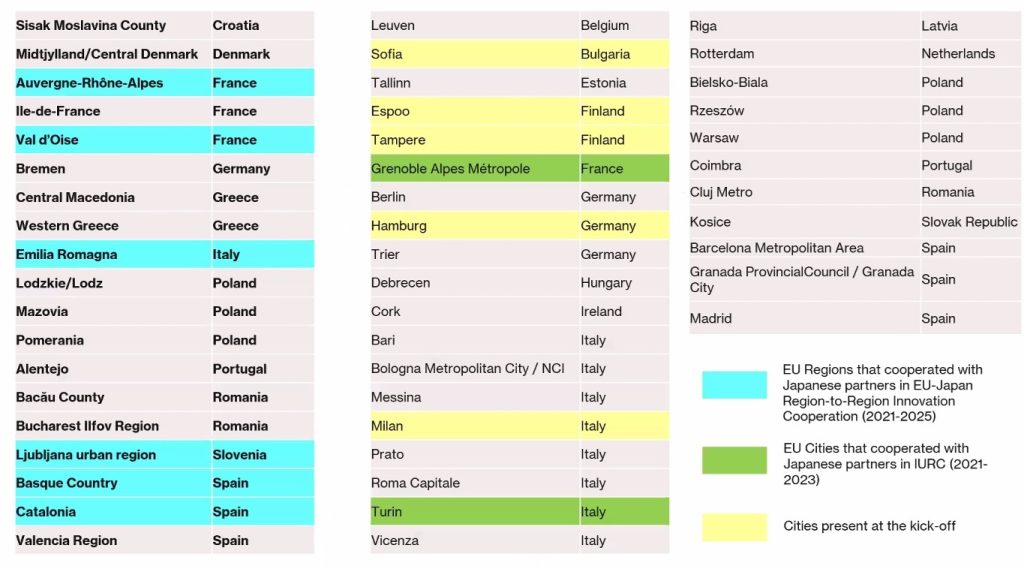
Japanese Prefectures and Cities: Deepening Thematic Cooperation
Four Japanese prefectures—Aichi, Kyoto, Osaka, and Hiroshima—outlined their ongoing and emerging collaborations with European counterparts.
- Aichi Prefecture, home to Toyota and Japan’s largest automotive cluster, is advancing its industrial ecosystem transformation. It showcased STATION Ai, Japan’s largest start-up incubation hub, as a key driver of innovation.
- Kyoto Prefecture, the co-host of the event, reaffirmed its cooperation with Catalonia and invited partnerships in smart city technologies and food-tech innovation.
- Osaka Prefecture focused on life sciences, decarbonisation, and manufacturing resilience, highlighting synergies with Europe’s green industry transition and the ongoing Osaka–Kansai Expo 2025.
- Hiroshima Prefecture, leveraging its industrial base anchored by Mazda, outlined its ambition to nurture ten unicorn companies through collaboration in industrial innovation and start-up acceleration.
- In addition, Fukuoka Prefecture expressed interest in joining IURC2 through partnerships on hydrogen and clean energy.

At the city level, five Japanese municipalities—Kawasaki, Nagoya, Osaka, Kyoto, and Kitakyushu—presented their thematic interests:
- Kawasaki City focused on climate adaptation and health impacts, including innovative measures to prevent heatstroke and mitigate heatwave risks.
- Nagoya City invited European partners to its upcoming TechGALA 2026, an international event for deep-tech and start-up collaboration, reinforcing its ambition to become Japan’s hub for technology exchange.
- Osaka City, active across three thematic clusters—mobility, circular economy, and urban innovation—highlighted its integrated approach to city transformation.
- Kyoto City showcased its citizen-led sustainability actions, including a Circular Festival promoting clothing reuse and behavioural change towards carbon neutrality.
- Kitakyushu City, internationally recognised as Japan’s pioneer of circular economy development, shared its success in transforming a former pollution hotspot into a model green city, leading national efforts on recycling industries and SDG localisation.
- Kobe City, a participant in the Urban Innovation cluster, contributed inputs despite not attending in person.

Looking Ahead: Building the Next Chapter of EU–Japan Cooperation
The IURC Japan Kick-off concluded with a strong commitment from all participants to deepen partnerships through pilot actions, peer exchanges, and joint events under IURC2. Both long-standing and newly participating regions expressed readiness to align local innovation strategies with the global sustainability agenda.
As the IURC enters its next stage, Japan’s active engagement positions it as a cornerstone of Asia–Australasia regional cooperation, contributing expertise in advanced manufacturing, digitalisation, and community-driven sustainability. The collaborative spirit demonstrated in Kyoto sets the tone for mutually beneficial partnerships that will continue to shape the EU–Japan dialogue on resilient and inclusive cities and regions.


